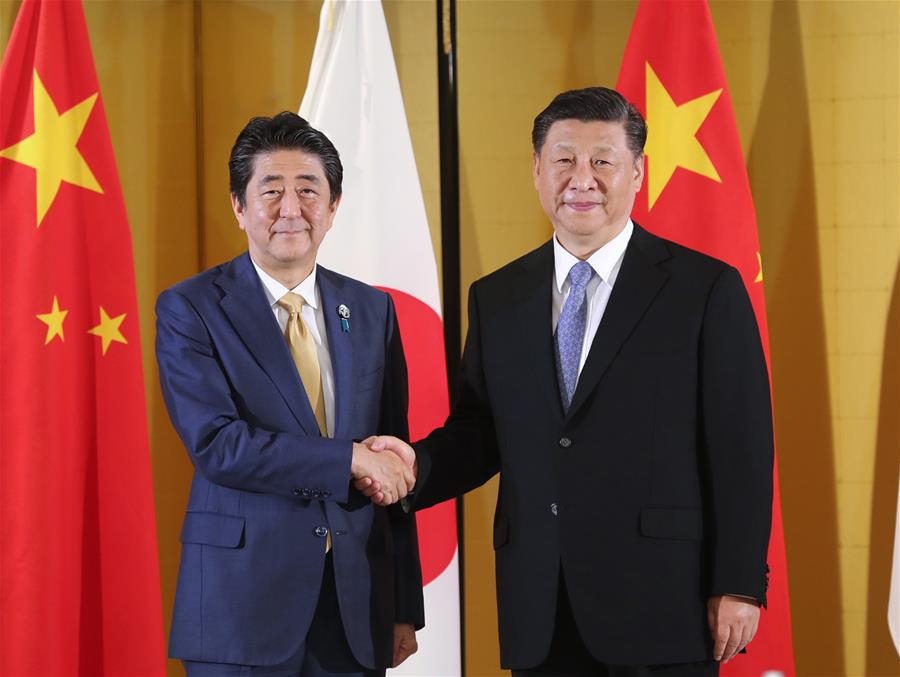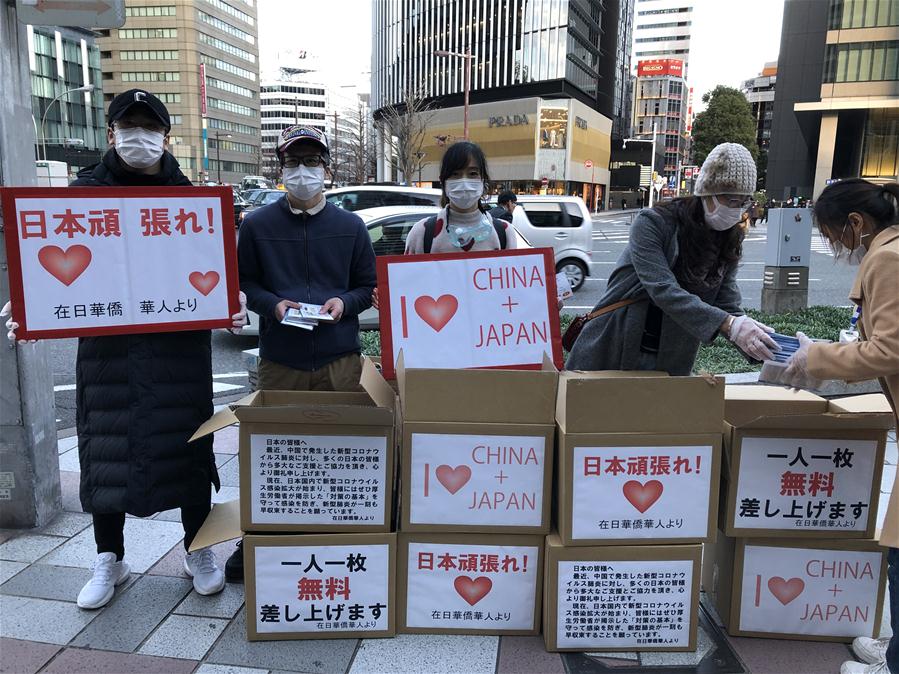Saturday marks the 75th anniversary of Japan's surrender in World War II. Over the past few decades, the Sino-Japanese relationship has experienced ups and downs.
Last June, the bilateral ties entered a new era following Chinese President Xi Jinping's meeting with Japanese Prime Minister Shinzo Abe in Osaka. If all had gone according to the plan, President Xi would have visited Japan "when Sakura blooms" this year, the first of its kind in a decade.
However, all plans are at the mercy of events. Due to the COVID-19 outbreak, Xi's meeting with Abe was postponed. The bilateral ties have gone through some twists over Hong Kong and Diaoyu Islands: Japan is also facing a dilemma between China and the U.S.
Bilateral ties enter new era
During their Osaka meeting last summer, Xi and Abe reached a 10-point consensus to jointly promote the healthy development of bilateral relations. The Chinese president agreed in principle to pay a state visit to Japan this spring, turning a new page on ties between the two countries.

Chinese President Xi Jinping (R) meets with Japanese Prime Minister Shinzo Abe in Osaka, Japan, June 27, 2019. /Xinhua
Chinese President Xi Jinping (R) meets with Japanese Prime Minister Shinzo Abe in Osaka, Japan, June 27, 2019. /Xinhua
Xi and Abe spoke highly of the sound momentum in the development of China-Japan relations and agreed that as both countries have entered a new era of development, joint efforts are needed to build bilateral relations that meet the requirements of the new era.
The two leaders also agreed to properly handle sensitive issues and manage disputes and differences constructively.
China and Japan, both important Asian countries and major global economies, are closely connected on many fronts. Economically, the bilateral trade exceeded 315 billion U.S. dollars in 2019 and people-to-people exchanges last year hit a record high of 12.8 million.
Goodwill in virus fight
The COVID-19 pandemic highlighted a shared bond between the two neighbors, with regular acts of goodwill and support from both sides.
Among the many countries that came to China's aid in the early stage of the pandemic, Japan responded with remarkable speed. In late January, photos of boxes of donated masks from Japan bearing lines of classical poetry, such as "Although we are in different places, we are under the same sky," went viral on Chinese social media.
China's foreign ministry said it was "extremely touched" by the poetic gift. "The epidemic is temporary, but friendship endures," said foreign ministry spokesperson Hua Chunying, praising photos seen online of Japanese pharmacies with signs saying "Let's go, China!"

A Chinese volunteer group distribute face masks to local people in Nagoya, Japan, February 20, 2020. /Xinhua
A Chinese volunteer group distribute face masks to local people in Nagoya, Japan, February 20, 2020. /Xinhua
Local governments in Japan also provided "targeted support" to their Chinese sister cities and the country did not rush to impose a blanket entry ban on all Chinese visitors.
Japan's Oita Prefecture, a sister prefecture of Wuhan, sent 30,000 face masks, 600 sets of protective clothing and 400 pairs of goggles to the Chinese city on January 27. Since then, other Japanese cities have also taken action to support China's battle against the pandemic.
"For Japan, when it sees a virus outbreak in China, it is like seeing a relative or neighbor suffering," said Toshihiro Nikai, secretary-general of the ruling Liberal Democratic Party (LDP). “The Japanese people are willing to help China and hope the outbreak will pass as soon as possible."
China did not hesitate to return a helping hand when infections in Japan began growing, donating protective clothing, face masks and nucleic acid testing kits to Japan.
When the Diamond Princess was quarantined, China sent testing kits. Chinese billionaire Jack Ma donated one million face masks to Japan. China's telecoms giant Huawei also pitched in, donating face masks to a university hospital in Nagoya that treated Chinese passengers from the cruise ship.
Hong Kong, Diaoyu Islands and the U.S.
Tensions between the countries over China's Hong Kong affairs and the Diaoyu Islands have emerged in recent weeks, however.
"While hopes were growing that anti-pandemic cooperation would lead to further improvements in bilateral relations, there have been strong, dark currents flowing below," said Liu Jiangyong, an international relations expert with Tsinghua University in Beijing.
Abe said on June 10 that Tokyo wants to take the lead among the G7 nations to issue a statement about the situation in Hong Kong.
China passed national security legislation for its Hong Kong Special Administrative Region on June 30, a central government's effort that makes secession, subversion and collusion with foreign forces illegal.
Foreign ministry spokesperson Hua Chunying expressed grave concerns to Japan, saying Hong Kong affair is "entirely China's internal affairs and foreign countries have no right to interfere."
Disputes in territorial waters are another headache in China-Japan ties. In a defense white paper issued on July 15, Japan criticized China's legitimate military operations in the South China Sea.

Diaoyu Islands and nearby islands. /Xinhua
Diaoyu Islands and nearby islands. /Xinhua
On the Diaoyu Islands, it said that China had "relentlessly" continued unilateral attempts to alter the islands' status quo.
Tokyo has recently played games over the issue. On June 22, Japan's Ishigaki Municipal Assembly approved a bill to change the Diaoyu Islands' administrative designation. Japan also lodged diplomatic protests with China over Chinese coastguard vessels' normal operations near the islands.
Chinese foreign ministry spokesperson Zhao Lijian condemned Japan's move, saying it is a "serious provocation on China's territorial sovereignty" and is "illegal and invalid," adding that it will not change the fact that the Diaoyu Islands belong to China.
The cooling of ties also comes amid mounting tensions between China and the United States.
Ties between the world's two biggest economies turned sour over trade and have worsened recently over the pandemic and China's Hong Kong issue, as Donald Trump has targeted China in an attempt to gain domestic support in the run-up to November's presidential election.
Japan is walking a tightrope between its biggest trading partner China and its military ally the U.S.